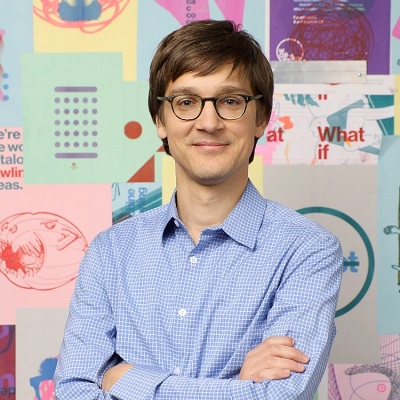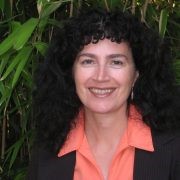PRE-CONFERENCE EVENT TO THE WEB CONFERENCE 2021
Special event on the flavour of the coming 30th The Web Conference is scheduled for April 1, 2021.
Welcome to 3 hours of free event with exceptional keynote speakers. We start at 5 PM in Ljubljana (CEST +1), 4 PM in London, 11 AM in New York, 8 AM in San Francisco)
Registrations are now closed. Email twc@pitea.si for further assistance.

Jure Leskovec
Stanford University
Mobility network models of COVID-19 explain inequities and inform reopening
The COVID-19 pandemic dramatically changed human mobility patterns, necessitating epidemiological models which capture the effects of changes in mobility on virus spread. In this talk we will introduce a metapopulation SEIR model that integrates fine-grained, dynamic mobility networks to simulate the spread of SARS-CoV-2 in 10 of the largest US metropolitan statistical areas. Derived from cell phone data, our mobility networks map the hourly movements of 98 million people from neighborhoods (census block groups, or CBGs) to points of interest (POIs) such as restaurants and religious establishments, connecting 57k CBGs to 553k POIs with 5.4 billion hourly edges. We show that by integrating these networks, a relatively simple SEIR model can accurately fit the real case trajectory, despite substantial changes in population behavior over time. Our model predicts that a small minority of “superspreader” POIs account for a large majority of infections and that restricting maximum occupancy at each POI is more effective than uniformly reducing mobility. Our model also correctly predicts higher infection rates among disadvantaged racial and socioeconomic groups solely from differences in mobility: we find that disadvantaged groups have not been able to reduce mobility as sharply, and that the POIs they visit are more crowded and therefore higher-risk. By capturing who is infected at which locations, our model supports detailed analyses that can inform more effective and equitable policy responses to COVID-19.
Jure Leskovec <http://cs.stanford.edu/~jure> is Associate Professor of Computer Science at Stanford University, Chief Scientist at Pinterest, and investigator at Chan Zuckerberg Biohub. Dr. Leskovec was the co-founder of a machine learning startup Kosei, which was later acquired by Pinterest. His research focuses on machine learning and data mining large social, information, and biological networks. Computation over massive data is at the heart of his research and has applications in computer science, social sciences, marketing, and biomedicine. This research has won several awards including a Lagrange Prize, Microsoft Research Faculty Fellowship, the Alfred P. Sloan Fellowship, and numerous best paper and test of time awards. It has also been featured in popular press outlets such as the New York Times and the Wall Street Journal. Leskovec received his bachelor’s degree in computer science from University of Ljubljana, Slovenia, PhD in machine learning from Carnegie Mellon University and postdoctoral training at Cornell University.
The Web conference will take place in April 2021 as a virtual one. Registrations are open.
You can expect 357 papers presentations, posters, demo, developers track, PhD Symposium and much more.

Evelyne Viegas
Microsoft Research
Challenges in Machine Learning – Designing high impact competitions for the benefit of society
Competitions have been used in Machine Learning as an efficient and cost-effective way to bring mature solutions that were confined to research to industries. Competitions can be used as a means of directing research, advancing the state-of-the-art or venturing in completely new domains. Over the years competition platforms have put more effort into the theoretical foundations of challenge design, the optimization of challenge protocols, and data collection. However, little thoughts have been put on how to involve the worldwide community of challenge participants and organizers in solving global challenges. In this talk, I will go over progress made in designing high impactful competitions looking at new paradigms of challenge organizations to tackle complex problems (e.g., tasks involving multiple modalities, levels of processing), large scale data, and at encouraging collaborative teams while fostering diversity in the community of participants to reduce selection bias in data collection. Finally, I’ll go over new research programs that focus on understanding the value and cost of developing large scale models that can be applied to AI innovations.
Evelyne Viegas is Senior Director of Global Research Engagement at Microsoft Research. She drives the research engagement strategy, designing collaborative programs which are open and cooperative with the external research community. She leads initiatives in the areas of Artificial Intelligence, Computing Systems and Experiences, working in partnership with the academic community, engineering and business groups, industry partners and government agencies worldwide. Prior to her present role, Evelyne worked as a Technical Lead at Microsoft delivering Natural Language Processing components to Office and Windows. Before Microsoft, and after completing her Ph.D. in France, she worked as a Principal Investigator at the Computing Research Laboratory in New Mexico on an ontology-based Machine Translation project. Evelyne serves on international editorial, program and award committees.
There are 23 tutorials and 25 workshops on our schedule in the week of April 12-16,2021.
Main conference days #TWC2021 offer innovative program with 16 keynote speakers.

Denny Vrandečić
Wikimedia Foundation
Towards knowledge equity: A world where everyone can share in the sum of all knowledge
Twenty years of Wikipedia. The encyclopedia that anyone can edit has become an indispensable knowledge resource on the Web, being the foundation for many other services and technologies. But its success is very unevenly distributed, and in many languages we don’t yet provide a comprehensive and current encyclopedia. Abstract Wikipedia is a project to considerably improve the situation by providing a baseline of knowledge in many languages. It will be based on a new Wikimedia project, Wikifunctions, that will launch later this year and provide a collaboratively edited library of functions, and thus democratizing access to functions to a much wider audience. In this talk we will present the plan for Wikifunctions and Abstract Wikipedia, and how it will contribute towards our vision of a world in which everyone can share in the sum of all knowledge.
Denny Vrandečić is the Head of Special Projects at the Wikimedia Foundation, where he leads the work on Abstract Wikipedia and Wikifunctions. Previously, he worked on the Google Knowledge Graph. He is the founder of Wikidata. Previously, he founded Semantic MediaWiki, used in many organizations such as NASA, the US intelligence agencies, the Metropolitan Museum of Art, and others. He received a PhD from KIT and was a visiting researcher at USC’s ISI in 2010. He was the founder of the Croatian Wikipedia, and was an elected member of the Wikimedia Foundation Board of Trustees. He has lived in Croatia, Stuttgart, Rome, Los Angeles, Berlin, and now the San Francisco Bay Area.
Kindly welcome to W4A conference as part of The Web Conference 2021
Open education is part of The Web Conference 2021. Our program is already online.

Marko Grobelnik
Jožef Stefan Institute
Cross-lingual Global Media Monitoring
Global media monitoring assumes dealing with large amounts of heterogeneous textual data across many languages in a near real-time. We will present a pipeline of machine learning, text mining, and semantic extraction components representing global social dynamics as an evolving network of interrelated events extracted from media. We will demonstrate the proposed approach on an operational system “Event Registry” (http://EventRegistry.org) for (a) collecting media information from over 300,000 news and social media sources, (b) performing linguistic and semantic processing in multiple languages, (c) forming cross-lingual events and event sequences, (d) streaming information about events in open data formats, (e) rich visualizations, and (f) complex queries to analyse global social dynamics. Challenges and technical solutions will be discussed.
Marko Grobelnik is a researcher in the field of AI. Marko co-leads Artificial Intelligence Lab at Jozef Stefan Institute, cofounded UNESCO International Research Center on AI (IRCAI), and is the CEO of Quintelligence.com. Marko represents Slovenia in OECD AI Committee (ONE AI), in Council of Europe Committee on AI (CAHAI), and Global Partnership on AI (GPAI). In 2016 Marko became Digital Champion of Slovenia at European Commission.
Additional events to The Web Conference 2021: The future of the web, BIG, Ai day, Future of the web, Web of Health, Web4All, Politics of the web and Open education day.
Welcome to register to The Web Conference 2021.

Stan Matwin
Dalhousie University
Artificial Intelligence for People Emotion Detection During COVID-19 Social Isolation
Taking advantage of social media platforms, such as Twitter, this work in progress provides an effective framework for emotion detection among those who are quarantined. Early detection of emotional feelings and their trends help implement timely intervention strategies. Given the limitations of medical diagnosis of early emotional change signs during the quarantine period, artificial intelligence models provide effective mechanisms in uncovering early signs, symptoms and escalating trends. Early . Results of confirm the effectiveness of the proposed framework for topic trends and emotion detection of COVID-19 tweets. Our findings revealed Stay-At-Home restrictions result in people expressing on twitter both negative and positive emotional semantics. Semantic trends of safety issues related to staying at home rapidly decreased within the 28 days and also negative feelings related to friends dying and quarantined life increased in some days. These findings have potential to impact public health policy decisions through monitoring trends of emotional feelings of those who are quarantined.
Stan Matwin is the Director of the Institute for Big Data Analytics at Dalhousie University, Halifax, Nova Scotia, Canada where he is a Professor and Canada Research Chair in Interpretability for Machine Learning. He is also a Distinguished Professor of the University of Ottawa and a Professor at the Institute of Computer Science of the Polish Academy of Sciences. His main research results are machine learning, particularly applied to data derived from the world’s oceans, text mining, applications of machine learning, and in data privacy. Stan Matwin is a EurAI Fellow, a Fellow of the Canadian AI Association and a recipient of its Lifetime Achievement Award.
Additional events to The Web Conference 2021: The future of the web, BIG, Ai day, Future of the web, Web of Health, Web4All, Politics of the web and Open education day.
Welcome to register to The Web Conference 2021.

